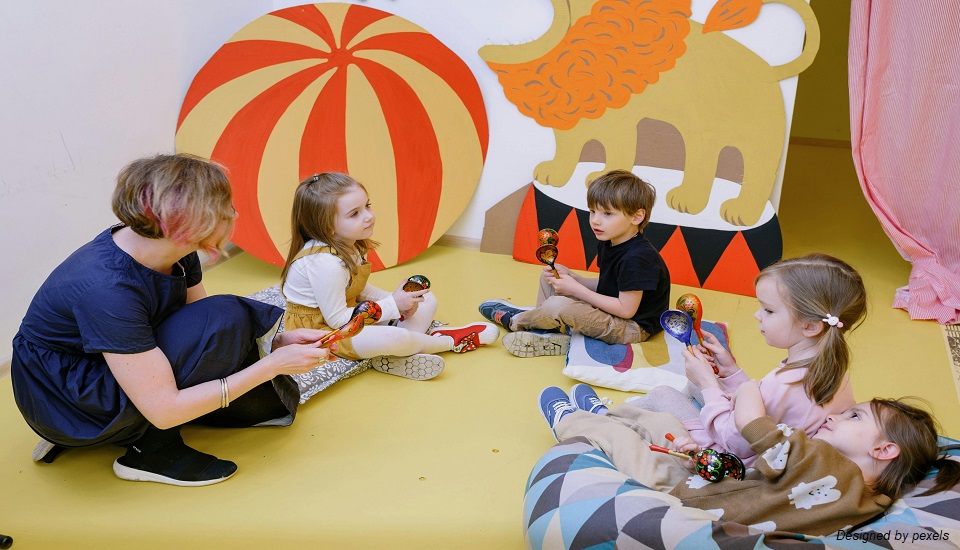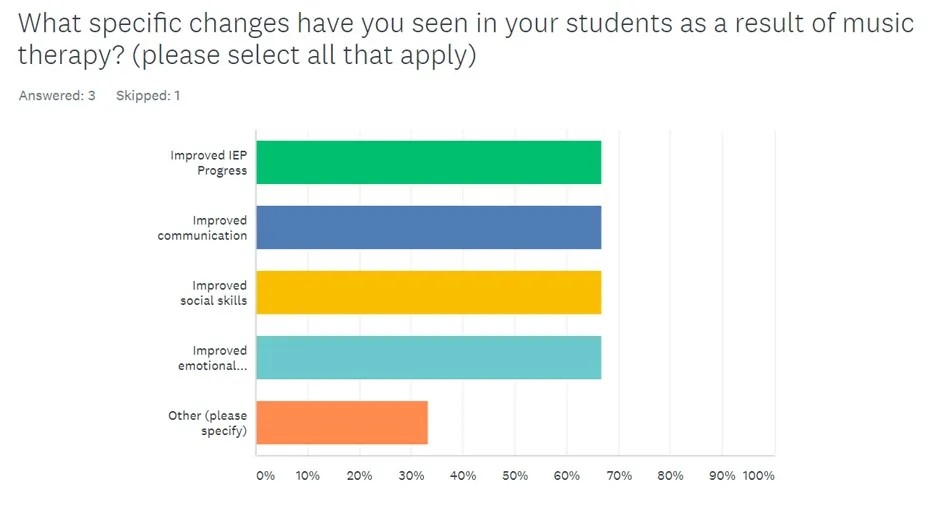
Music for kids has a profound influence on their development and learning. You might be surprised by the significant impact it can have, especially in special needs classrooms. The benefits of music for children go beyond just entertainment, offering a powerful tool to enhance various aspects of their growth and education.
In the below image, you can witness in various different aspects how it benefitted the special needs children.

Those special needs educators who have pursued courses like Online Special Education Courses know the benefits of incorporating music for children in the classroom, it’s more than just a fun activity.
It has an impact on cognitive, emotional, and social skills. From boosting creativity to improving memory, music offers a unique approach to learning. What's more, it can create an inclusive environment, helping children with special needs to connect with their peers and express themselves in new ways.
In this blog post, let’s get to know several benefits of incorporating musical activities in the special needs classroom.
So, without any further delay, let’s get started.
1. Promotes Self-Expression and Creativity
Music for kids in special needs classrooms is a powerful tool to encourage self-expression and boost creativity. When you introduce music into these learning environments, you're opening up a world of possibilities for children to communicate and explore their inner selves.
Creative Outlets for Special Needs Children
Music offers a unique way for children with special needs to participate in learning. Unlike traditional classroom settings that rely heavily on auditory or visual cues, music engages multiple senses. This multi-sensory approach allows children to interact and express themselves in ways that might not be possible through speaking or writing alone.
Self-Expression through Music
For many children with special needs, turning inner feelings into verbal expression can be challenging. Music bridges this communication gap by allowing them to express themselves without words. Through musical activities, children can convey their experiences, emotions, and thoughts freely. This freedom of expression often brings relief and a sense of empowerment.
Building Confidence and Self-Esteem
As children create and play music, they often experience a profound sense of achievement. This feeling has a positive impact on their self-esteem and confidence. Music therapy can help develop a clearer sense of self and autonomy, encouraging teamwork and enhancing communicative skills. These benefits reduce the need for children to use challenging behaviours to express frustration or anguish.
Moreover, musical activities support personal and psychological development by fostering introspection and helping children process complex emotions. Even children with limited cognition can feel good about themselves and find relaxation through musical outlets. The creative interaction inherent in music makes it an ideal teaching tool, particularly for children with Autism Spectrum Disorder (ASD), cerebral palsy, or learning disabilities.
2. Enhances Sensory Processing
Music for kids in special needs classrooms has a significant impact on sensory processing. When you introduce music into these learning environments, you're providing a powerful tool to enhance cognitive, language, and sensorimotor processes.
Music and Sensory Integration
Music therapy, particularly Orff Music Therapy, uses sensory awareness and sensory-motor integration with language. This approach expands children's potential and leads them along their learning path. By engaging in musical activities, you're challenging the brain to look for patterns, differentiate tones, and process multiple sounds simultaneously. This multi-sensory approach allows children to interact and express themselves in ways that might not be possible through traditional learning methods.
Auditory Processing Improvements
For children with Auditory Processing Disorder (APD), music can be particularly beneficial. APD affects a child's ability to process and understand the sounds they hear. Music therapy has been shown to improve auditory processing skills, especially when performed regularly. Research has found that trained musicians' brains can selectively sort meaningful musical sounds from non-meaningful ones with greater ease than the average person. This skill transfers to processing language sounds as well, particularly in noisy environments.
Multi-Sensory Learning Experiences
Music education provides a multisensory learning experience, engaging at least three out of the five senses. When you provide musical education tactics, including learning to read and write music, cognitive skills are put to work at a multisensory level.
Children not only listen to the music but also manually count out beats by clapping or patting, involving the sense of touch. This multi-sensory approach helps increase overall brainpower, as learning through more than one sense leads to greater understanding.
3. Improves Memory and Recall
Music for kids in special needs classrooms has a remarkable impact on memory and recall. When you incorporate music into learning, you're tapping into a powerful tool that can enhance cognitive functions and improve retention of academic material.
Music's Impact on Memory Function
Music activates multiple areas of the brain, creating wider-ranging neural connections. This increased brain connectivity can help students store and access information more effectively. When you use familiar tunes or rhythms to teach new concepts, you're providing additional "storage lockers" for information, making it easier to recall later.
Memorization Techniques through Songs
You can use songs as a memory aid for various subjects. It's often easier for students to remember lyrics than to memorize plain text. Try these techniques:
Long-term Cognitive Benefits
Regular musical training can have lasting effects on cognitive development. It may accelerate the development of neural connections, particularly between ages 6 and 12. This can lead to improved verbal memory and enhanced attention skills. By incorporating music into your teaching, you're not just helping students remember facts – you're potentially boosting their overall cognitive abilities for the long term.
4. Fosters Inclusion and Peer Interaction
Music for kids in special needs classrooms has a remarkable ability to create an inclusive environment and encourage peer interaction. When you incorporate music into your teaching, you're opening up new avenues for students to connect and learn together.
Creating Inclusive Classroom Environments
To foster inclusion, start by organizing your classroom to be free of physical boundaries. This setup allows for multi-sensory instruction, including audio, visual, and tactile experiences. By providing various sensory experiences, you give students different routes to understand the material and demonstrate their knowledge using their strengths.
Peer Bonding through Music
Music activities naturally promote social interaction and community building. You can use collaborative music-making to decrease prejudice and increase understanding among students. By modelling positive language and assuming capability, you create a supportive atmosphere where all students feel safe and successful.
Collaborative Music Projects
Implement flexible groupings and frequent collaboration in your music projects. This approach allows students to teach each other, fostering strong social skills and inclusivity. Consider organizing joint concerts that bring together students with and without disabilities, merging different musical practices into one performance context. Such projects can significantly enhance group dynamics and musical interactions among diverse learners.
5. Provides a Structured Learning Environment
When you incorporate music into special needs classrooms, you're creating a structured learning environment that benefits students in numerous ways. This structure helps students feel secure and enhances their ability to learn effectively.
Routine and Predictability in Music Classes
Students with special needs thrive on routines. Establish a standard routine for your music classes, such as sitting, reviewing class behaviours, looking at a visual schedule, singing a hello song, doing activities, and ending with a goodbye song. This predictability reduces anxiety and prevents behavioural issues stemming from uncertainty about what's coming next.
Following Instructions and Sequencing
Use visual aids to help students understand and follow instructions. Combine auditory stimuli with visual cues to enhance comprehension and memory. For complex tasks, break them down into manageable parts. This approach helps students learn sequencing skills and improves their ability to follow multi-step instructions.
Time Management Skills
Music naturally provides structure through rhythm and timing. Use timers or music playlists to help students track time during activities. This teaches them to manage their time effectively, a crucial skill for academic success. For longer projects, work with students to break tasks into smaller, timed segments, helping them learn to estimate and allocate time appropriately.
Music Can Prove To Be a Therapy For Special Needs Children
Music for kids in special needs classrooms has a profound influence on their growth and learning. It offers a unique approach to boost creativity, enhance sensory processing, improve memory, foster inclusion, and provide a structured environment. All the above-mentioned benefits of music for children with special needs go beyond just entertainment, making music a powerful tool to help children with special needs connect with their peers and express themselves in new ways.
Additionally, if you want to learn more creative ways to help special needs children in every aspect of life, then consider pursuing courses like Online Special Education Courses, where you will get to learn top expert trainers from the education industry.
Get In Touch
UK – Registered OfficeAsian College Of Teachers Ltd (UK)
27, Old Gloucester Street, London – WC1N 3AX, UK
UK Toll Free: 0-808-189-1203
www.asiancollegeofteachers.co.uk
All SEN Courses are designed, developed and created by Asian College of Teachers Ltd, United Kingdom. These courses are certified by CPD Certification Service UK and endorsed by NCC Education, UK, and Short Courses from CACHE, UK through Laser Learning UK.
Asian College of Teachers (ACT) undertakes a continuous review of its teacher training courses to ensure imparting high quality education. However, there might be circumstances outside of ACT’s control which might affect its stakeholders like if you are planning to teach in a different country, applying for a teaching license, pursuing higher studies or trying to get the certificate approved by the Ministry of Education (MoE) of a particular country then you can do so with the certificate issued by Asian College of Teachers (ACT). However, each country’s Ministry of Education (MoE) or educational bodies set certain standards that are indispensable for the pursuit of higher studies or teaching in schools in that country. So it can be a possibility that you may be able to use the certificate for higher studies or teaching purposes in one country and not in another. Therefore, we strongly recommend that you investigate thoroughly and check with the relevant authorities regarding the acceptance of the certificate issued by us before you enrol on a particular course. ACT strives to offer high-quality education and its certificates can be valuable for various purposes internationally, but still it is crucial for individuals to verify the specific recognition of the certificate in the country they intend to use it, especially for formal education or professional licensing purposes. This approach ensures that the stakeholders make informed decisions regarding their educational and career paths.
© 2026 Asian College of Teachers. All Rights Reserved. Asian College Of Teachers is a trading brand of TTA Training Pvt. Ltd (India) - CIN U80902WB2016PTC215839, Asia Teachers Training Co., Ltd (Thailand) - Registration No. 0105558193360, Asian College Of Teachers Ltd (UK) - Company Number 9939942 & Asian College Of Teachers LLC, (USA) - Federal Tax Identification Number 30-1261596
Designed by kreativewebtech